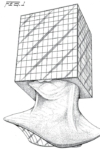by Max Rivlin-Nadler
“Is that love or something? Someone taking care of you in the dark?” In Leslie Jamison’s first novel, The Gin Closet, mere proximity gets confused with love in the struggle against loneliness. Stella, a twenty-something in the City, frustrated with the repeated self-injury of her vapid community, steps out of her own life and tries to enact something realer. She quits her professor/lover, her cringe-worthy personal assistant job, and her long line of meaningless romantic encounters. She wanders through her failing grandmother’s Connecticut apartment, soaked in wine, wondering how youth could ever be enjoyed if its only going to end in this ugly, medicated, half-mad dying. After a fall though, her delirious grandmother lets slip about a secret child and suddenly Stella’s trajectory is set: she heads West.
In Nevada, Stella finds her Aunt Tilly, who’s been in the well for over thirty years. Even before going, she decides to rescue her in an act of conscious self-restoration. By succeeding where her grandmother and mother failed, Stella can claim some limited amount of responsibility and finally be an Adult. Jamison isn’t at all interested in her success however, relishing the failures a spirit will endure if it enfeebles its own experience. It is revealed that Stella has had her own share of trauma, anorexia and an abortion, and the novel acts as a cautionary tale for those reckless young seeking responsibility—you already have your hands full.
The novel is divided into two perspectives: Stella’s, where the writing is stronger, and Tilly’s, where it’s a stretch. Maybe the author was making an effort to move away from the similar perspectives offered by Stella and the narrator of “Quiet Men”—Jamison’s breakout story from 2007—but Jamison excels at writing protagonists sensitive to the meaningless shields and impulsive diversions a young person develops. I wish Tilly’s flower-child burnout was a little less unrelenting and she was a more realized and original drunk. Still, Tilly’s been down Stella’s path and answers the question posed above with sullen authority—“It’s not love. But I wish it could be.”
Check out my interview with Leslie Jamison this Thursday.
This post may contain affiliate links.







